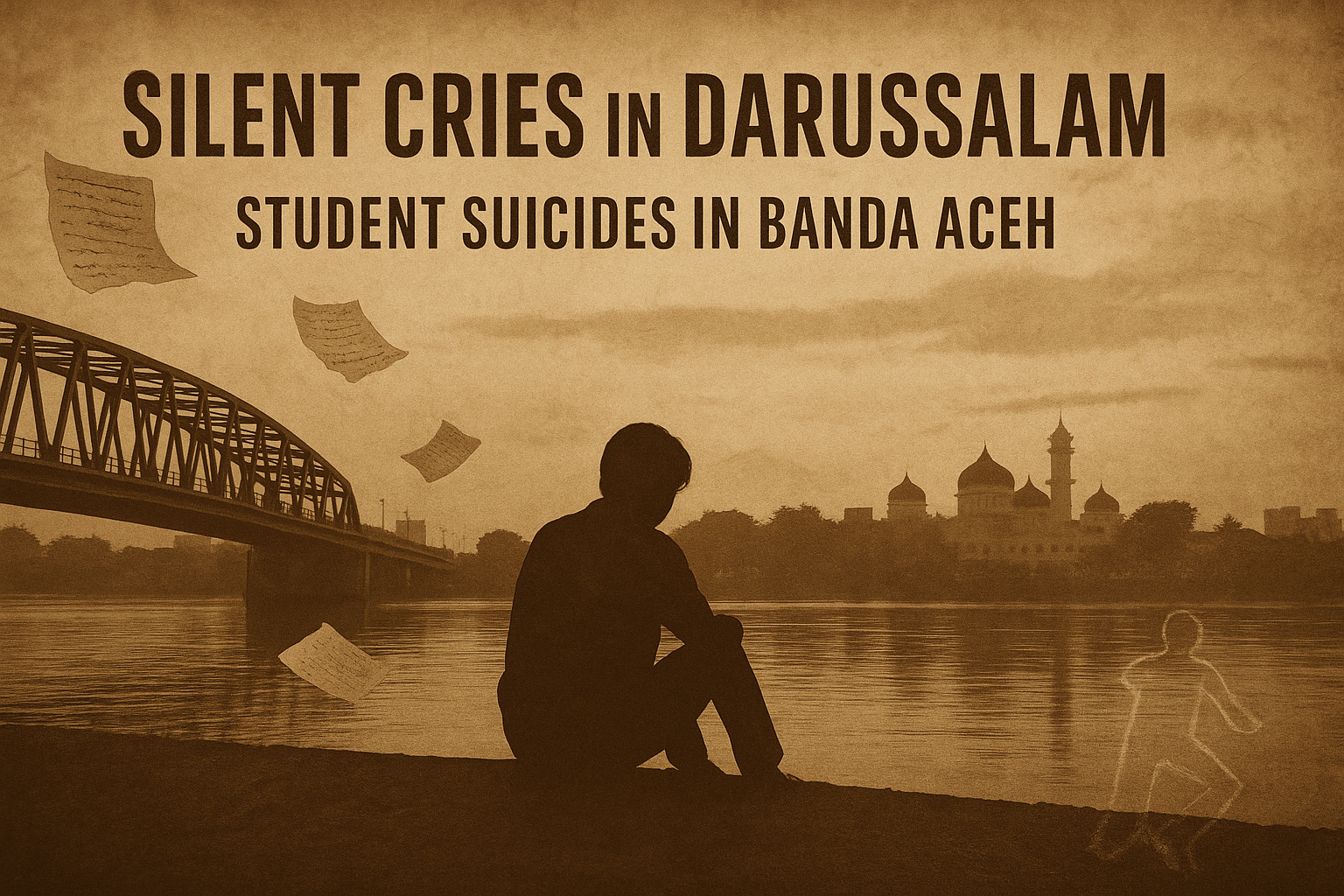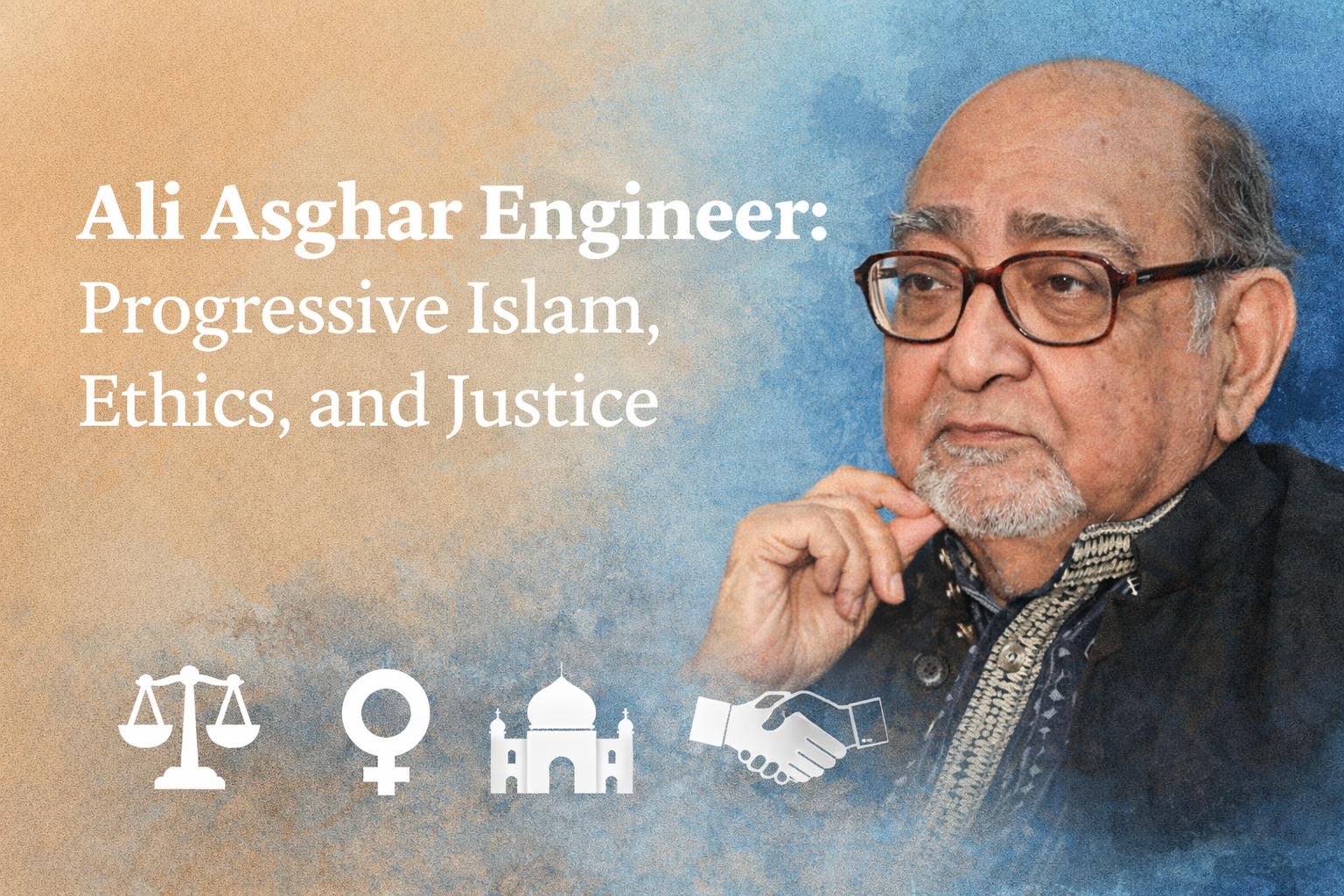Introduction
The recent suicide of a female student in Banda Aceh marks yet another heartbreaking entry in a growing list of tragedies. Over the past few years, this city—renowned as the heart of higher education in Aceh—has witnessed a disturbing rise in cases of students taking their lives. Most victims have been young people who came here with dreams of education and a better future.
Conversations on social media reveal a rising sense of alarm, but awareness alone is not enough. As someone who has spent decades teaching in Darussalam and walking alongside generations of students, I feel a moral responsibility to speak. Each of these students carried stories—often silent, often unseen—that we, as educators, peers, and community members, must no longer ignore.
My own encounters, mentoring, and private conversations with students reveal recurring themes that shed light on why so many of them face challenges. We must expose these painful insights to confront the crisis honestly.
The Crushing Weight of Social and Financial Pressures
First, we must acknowledge the immense burden of social and financial pressures that weigh heavily on students who come to Banda Aceh. Many of them arrive from villages or small towns, bringing with them the hopes of entire families. Parents often sell land, pawn jewelry, or borrow money to cover tuition, rent, and living expenses. For these young people, failure is not an option; success is not only personal but also communal. Yet the city’s economic landscape is unforgiving. Rent rises, food costs climb, and the urban lifestyle quietly demands spending that far exceeds what their families can provide.
In response, students are forced to seek independence, searching for income streams to sustain themselves. At first, these are simple ventures: helping friends with assignments, reselling goods online, working part-time in cafés or retail shops. However, the competition is fierce, and the illusion of “easy money” circulates quickly among students. Stories of peers making quick gains lure others into trying their luck, whether through online gambling, crypto-trading scams, or “side businesses” with unclear ethics.
The darker side emerges when students, particularly young women, confess to commodifying their bodies. This is perhaps the most painful reality I have witnessed. They do it as a last resort when all other options have been exhausted. Beneath their polished Instagram posts is a brutal economy of survival, where dignity is sacrificed in the name of necessity. Banda Aceh, with its proud reputation as a city of Islamic scholarship, hides within it these silent struggles.
The shame of these choices further isolates students. They cannot tell their families, fearing they will break their parents’ hearts. They cannot share with lecturers, fearing moral judgment. And so they remain silent, carrying an unbearable burden alone. Many cry themselves to sleep in small rented rooms, wondering how long they can continue living in contradiction between who they are and what they must do to survive.
The city’s social ecosystem adds another layer of pressure. Appearances judge students: what they wear, where they eat, and which café they frequent. Those who cannot keep up feel left behind. They see their peers enjoying modern lifestyles, posting photos with new phones, or traveling on holidays, and silently feel the sting of inferiority. Social media amplifies this pain, magnifying the gap between reality and aspiration.
Over time, these financial and social pressures become a silent poison. Grades slip, health deteriorates, and sleep disappears. The student who once dreamed of lifting their family out of poverty now feels trapped in a cycle of despair. When the pressure finally exceeds their capacity, some tragically choose to end their lives, believing it is the only escape from a city that promised so much yet delivered so little.
This incident is not an individual failure—it is a collective one. It reveals cracks in our system of education, in our city’s economy, and in our social conscience. If we fail to recognize these pressures, we will continue to lose more of our brightest youth.
Broken Homes and Emotional Fallout
The second reality behind many student suicides lies in the broken homes they carry with them. Some arrive in Banda Aceh not only with limited finances but also with fractured emotional foundations. Parental divorce, domestic conflict, or abandonment leaves deep scars that are invisible yet corrosive. When I listen to their stories, I hear echoes of children forced to grow up too quickly, students who carry the weight of unresolved trauma into every classroom.
These young people are not just learning mathematics, law, or medicine—they are simultaneously struggling to survive emotionally. For them, the university is not a sanctuary of knowledge but an escape from homes filled with shouting, silence, or neglect. Yet, the escape is incomplete. The wounds follow them into their boarding houses, haunting them at night when assignments pile up and loneliness sharpens.
The pressure to succeed academically intensifies these wounds. They are told, implicitly or explicitly, that they must graduate on time and prove themselves, despite the chaos of their family background. Failure is not merely academic; it is existential. If they fall behind, they feel they have let down not only themselves but also the fragile narrative they cling to—that education can heal the brokenness of their lives.
Many of these students juggle multiple part-time jobs to support themselves, working in cafés, laundry shops, or construction. They return to their rooms exhausted, with little energy left to study. Their grades slip, their bodies weaken, and their minds spiral into self-blame. What was once the hope of education turns into a treadmill of exhaustion.
Some are pushed into morally questionable choices. Out of desperation, they take on jobs that compromise their safety or values—the conflict between survival and morality tears at their conscience. In silence, they ask themselves, “What would my parents say if they knew? What would my community think?” The shame corrodes their will to continue.
The tragedy here is not simply economic—it is the absence of emotional anchors. These students must navigate the storm alone, lacking stable homes, mentors, and trusted confidants. For some, the loneliness becomes unbearable. Suicide appears not as a rejection of life but as the only way to silence the chaos inside.
Unless we acknowledge the link between broken families and student despair, we will misdiagnose the root of the problem. Banda Aceh must invest not only in academic infrastructure but also in emotional support systems that recognize the whole student, not just their grades.
Trauma, Violence, and Bullying
For another group of students, the heaviest burden they carry is the scar of violence. Some have endured domestic abuse, where fathers lash out in drunken rage or mothers collapse under the weight of despair. Others face violence in more subtle forms—belittlement, verbal humiliation, or neglect. Lecturers, often focused on assignments and attendance, silently carry these wounds into classrooms.
The school system itself is not always innocent. Students have told me of bullying, both physical and psychological, that occurs within educational institutions. Occasionally, it is blatant: harsh words, public humiliation, or exclusion. Occasionally, it is invisible: whispered rumors, subtle discrimination, or systemic neglect. Each wound chips away at a student’s sense of worth.
Violence breeds rebellion, but rebellion without direction often turns destructive. Some students lash out, turning to drugs, alcohol, or reckless behavior. Others turn inward, collapsing under the weight of their scars. Both paths lead to instability, and both increase the risk of self-destruction.
The trauma of violence is not easily healed. Even when students leave their homes or schools, the memories follow them. At night, they revisit scenes of abuse, reliving the words that pierce deeply. The classroom becomes a battlefield where they struggle not against exams but against invisible enemies in their minds.
For these students, education becomes secondary. Their primary battle is survival. Every smile they show hides a war within. Every assignment submitted is a victory against despair. But the victories are fragile, and when the weight becomes too much, suicide becomes an escape from a war they feel they cannot win.
Universities often fail to recognize these silent wars. They focus on curriculum, research, and rankings, but forget that behind every statistic is a human being whose life may be unraveling. Without systems of care—counseling centers, safe reporting mechanisms, and trauma-informed lecturers—we risk turning campuses into breeding grounds of despair.
The tragedy of violence must be addressed not as an individual weakness but as a societal failure. If Banda Aceh wishes to be an actual city of knowledge, it must also be a city of healing.
Freedom Without Direction
For many students, the transition from high school to university life in Banda Aceh is not just geographical but moral and existential. In high school, they may have enjoyed unstructured freedom—unmonitored friendships, late-night outings, and experimentation with lifestyles unchecked by authority. Arriving in the capital of Aceh’s education, they suddenly find themselves in an environment where the temptations multiply and the boundaries blur. What once felt like harmless fun at home becomes a dangerous invitation in the city.
Banda Aceh itself is a paradox. It is at once a city that projects Islamic discipline and yet thrives on an undercurrent of youth experimentation. Coffee shops are packed late into the night; boarding houses teem with stories of unmonitored parties; motorcycles line the streets as students roam restlessly, searching for belonging. For those who lack strong role models, the city becomes a playground without fences. Recklessness is celebrated as independence, and silence from authority figures is mistaken for approval.
The absence of guidance is critical here. Students who were once gently directed by teachers, family members, or village elders now find themselves without trusted mentors. University life, often imagined as structured and nurturing, instead feels like a vast ocean where each student must navigate alone. In this ocean, some swim; others sink. The tragedy is that those who sink rarely make noise until it is too late.
In conversations with my students, I have noticed the patterns. Those who enter with discipline, anchored by values, often manage to navigate the turbulence. However, those who come seeking freedom without direction tend to drift quickly. They experiment with substances, relationships, or financial risks, believing themselves untouchable. Initially, it feels exhilarating. Over time, it becomes exhausting. And exhaustion, when combined with academic pressure, can spiral into despair.
This “freedom without direction” is not a simple matter of youth mischief. It is a deeper issue of identity formation. Students in Banda Aceh are not only building careers—they are building themselves. Without anchors, they construct fragile selves that collapse under the weight of failure. Their laughter in cafés often hides silent confusion: Who am I? What am I doing here? Where am I going?
The city does not answer these questions. Peers often give only temporary comfort, and lecturers are too distant to provide deep guidance. Parents are far away, usually believing their children are safe simply because they are “in Banda Aceh.” Yet behind closed doors, these young people wrestle with demons they cannot name. They drift further into choices that later fill them with regret.
When regret hardens into hopelessness, the consequences are tragic. Some of the suicides we have witnessed are not rooted in one dramatic event but in this long slow drift: a freedom that felt liberating until it became a cage of chaos. Banda Aceh must confront the truth that freedom, without moral and emotional direction, can be as deadly as oppression.
Predation and Exploitation
Perhaps the most alarming factor in this crisis is the predatory behavior that festers within student life itself. Vulnerable freshmen—away from home for the first time, searching for belonging—often fall prey to seniors or peers who exploit their innocence. The power dynamics are subtle yet coercive, masked as mentorship, organizational hierarchy, or friendship. Over the years, I have heard countless whispers of this exploitation, whispered because to speak loudly is to risk shame and retaliation.
Student organizations, which should nurture leadership and solidarity, sometimes morph into arenas of coercion. Freshmen are pressured into acts they would never choose freely, whether through hazing rituals, financial demands, or emotional manipulation. In more sinister cases, compromising photos or videos are circulated as tools of blackmail. What begins as an initiation quickly becomes a trap. Those ensnared feel they cannot escape.
Boarding houses and low-cost accommodations often intensify these risks. With minimal supervision and weak community oversight, such spaces become breeding grounds for predation. Older students, landlords, or even peers exploit the naivety of newcomers. I have heard stories of students lured into relationships they did not want, forced into financial debts they could not pay, or manipulated into acts that haunted them for years.
The digital age has made this predation more brutal. Social media becomes a weapon of humiliation. A single photo, shared in trust, can be twisted into endless threats. Victims find themselves trapped between exposure and silence. Most choose silence, enduring abuse rather than risk their families finding out. This silence corrodes their self-worth, leaving them isolated and ashamed.
The tragedy is that institutions rarely acknowledge these predatory acts. Universities often look the other way, insisting that such matters are “personal issues.” Yet for the student, they are not personal—they are life-shattering. The weight of humiliation and fear pushes some into isolation and, for a few, into suicide.
We must not underestimate the depth of the psychological damage caused by predation. For many victims, trust is shattered. They begin to see every friendship as a potential trap, every offer of kindness as a possible manipulation. Their world shrinks into a constant state of vigilance and fear. This is no way to live, and for some, it becomes unlivable.
If Banda Aceh wishes to protect its students, it must build systems of accountability and protection. Student organizations must be reformed, boarding houses must be monitored, and social media crimes must be pursued with seriousness. Predation thrives in silence; to break the silence is to break the cycle. Until then, we risk losing more students to the darkness of exploitation.
Power Imbalances in Academia
In the university environment, power is unevenly distributed. Lecturers, supervisors, and senior administrators hold positions of authority that significantly influence the academic experience of students. For most, these power structures function as guidance, mentorship, evaluation, and encouragement. Yet, in too many cases, professional boundaries are blurred, and authority is abused. Female students, in particular, find themselves navigating not only their coursework but also unwanted advances from those who should protect them.
This dynamic is often whispered but rarely confronted. A student may be invited for “private consultations” that cross into inappropriate territory. A supervisor may imply that success in a thesis depends not only on academic work but on compliance with subtle requests. For students already vulnerable, the implicit threat is suffocating: refusal might mean academic punishment; compliance means personal compromise. In both cases, the student loses.
The chilling effect of these experiences is profound. Instead of thriving, students retreat. They avoid office hours, they stop asking questions, and they deliberately remain silent in class to avoid drawing attention. Their education becomes haunted by fear, and their intellectual growth is stunted by the constant calculation of how to stay safe. The classroom—meant to be a sanctuary of inquiry—turns into a site of dread.
Most tragically, victims rarely report these abuses. They fear reputational damage. They worry that their families will blame them instead of supporting them. They calculate the risk of speaking out and conclude that silence, though painful, is safer. As a result, perpetrators operate with impunity, often repeating their behavior across generations of students. The cycle of exploitation continues unbroken.
The silence surrounding academic misconduct also erodes trust between students and lecturers more broadly. Even those who have never experienced harassment begin to wonder whether the system protects them or preys on them. Rumors circulate, fear spreads, and the integrity of the academic community is weakened.
It is tempting for institutions to dismiss these matters as isolated, but that denial only deepens the wound. Students who sense that their concerns will not be taken seriously lose faith in the system entirely. In such an environment, despair grows. For some, this despair feeds into the broader crisis of hopelessness that pushes them toward suicide.
The only path forward is transparency, accountability, and cultural change. Universities need to create secure reporting channels, enforce penalties for offenders, and cultivate an environment that strictly respects professional boundaries. Without such reforms, Banda Aceh risks turning its universities into spaces of quiet suffering instead of intellectual flourishing.
Communication Gaps and Emotional Strain
At first glance, communication may seem a trivial matter. But in the academic lives of students, small moments of silence can feel enormous. A lecturer who fails to reply to an email, a supervisor who delays responding to a thesis draft, or a faculty member who appears dismissive in class—these gestures, though minor to the lecturer, can be emotionally catastrophic for the student.
I have seen students send midnight messages, pleading for grade reconsideration, terrified of what failure might mean for their futures. Their words are heavy with desperation, not only for academic validation but also for recognition of their existence. When these messages go unanswered, students spiral into self-doubt: Am I not worthy of attention? Have I failed not only academically but also as a person?
This emotional turbulence stems from the profound power imbalance between students and lecturers. For many, a lecturer is not just a teacher but a gatekeeper to survival: the person who controls grades, scholarships, and recommendations. When communication is delayed or absent, the student feels invisible. Invisibility, for the already fragile, quickly transforms into despair.
The speed and volume of digital communication worsen this dynamic. Students raised in a culture of instant replies interpret silence as rejection. They scroll through social media and see peers posting achievements, while their emails remain unanswered. The contrast breeds anxiety, which compounds into depression.
It is essential to understand that these are not overreactions. A single unanswered message can feel like a collapse of the entire future for students whose scholarships, housing, or family pride depend on academic success. They bear a disproportionate burden due to the precarious nature of their lives.
Lecturers often do not realize the stakes. For them, a delayed response is simply a matter of workload or oversight. For the student, it is the difference between hope and despair. The gap between intention and impact is wide, and in that gap, many young people drown.
If Banda Aceh is to address this crisis, it must cultivate an academic culture of empathy. Lecturers must recognize the emotional impact of communication and approach students not merely as recipients of knowledge but as human beings in fragile transition. A timely word of encouragement, a simple acknowledgment, can save more lives than we realize.
Scholarship Pressures and Fear of Losing Support
For students reliant on KIP scholarships, education is a high-wire act. Every grade carries existential weight, because failure means not just academic delay but also the loss of a financial lifeline. The scholarship is more than money; it is permission to dream. Without it, the dream collapses.
The pressure to maintain academic excellence under such conditions is immense. Students measure their self-worth against GPA scores, terrified that a single misstep will strip them of both status and survival. While other students may shrug off a low grade, scholarship recipients see it as a death sentence. The constant anxiety eats away at their health, relationships, and motivation.
When scholarships are withdrawn, the consequences are devastating. Students suddenly find themselves without rent money, without food, without the means to continue. Many cannot return home due to the shame of failure. They remain in Banda Aceh, drifting, jobless, and hopeless. For them, the city becomes a prison of humiliation.
I have met students in this situation—too proud to return home, too poor to continue. They survive on borrowed money, temporary work, or silent hunger. Their peers may not notice, but their inner lives are collapsing. When the despair becomes unbearable, some see suicide as the only dignified exit.
The shame of reaching out to family worsens the isolation. Many students believe their parents have already sacrificed too much; confessing failure feels like betrayal. So they remain silent, pretending to be fine, even as their lives crumble. By the time anyone notices, it is too late.
This dynamic reveals the double-edged nature of scholarships: they provide opportunities but also create suffocating pressure. Without accompanying support systems—such as counseling, mentorship, and financial planning—they become traps as much as lifelines. Banda Aceh cannot celebrate the expansion of scholarships without also confronting the human costs of failure.
If we wish to prevent further tragedies, we must humanize the scholarship process. They should support, not suffocate. They must be accompanied by safety nets for those who falter, recognizing that students are human, not machines. Only then can scholarships truly empower rather than destroy.
Breaking the Silence, Building a Response
The crisis of student suicides in Banda Aceh is not a series of isolated tragedies. It is a collective failure, woven from threads of financial despair, broken families, violence, predation, exploitation, academic misconduct, communication gaps, and scholarship pressures. Each story is unique, but together they paint a picture of a system that fails to nurture the very youth it claims to serve.
We cannot remain silent. To treat each suicide as an isolated incident is to blind ourselves to the patterns. Every funeral is not just a personal loss but a social indictment: a reminder that we failed to listen, failed to protect, failed to respond. Silence is complicity.
The first step is acknowledgment. Universities, families, and society at large must admit that the crisis exists. Denial, however comforting, only deepens the problem. We must name the realities—exploitation, harassment, poverty, trauma—without euphemism. Only by naming can we confront.
The second step is action. Universities must establish counseling services that are accessible, confidential, and culturally sensitive. Faculty must be trained not only as educators but also as mentors and listeners. Families must remain emotionally engaged, not abandoning their children to the chaos of city life. And communities must replace stigma with compassion, understanding that asking for help is a sign of strength, not shame.
The third step is accountability. Predators, whether peers or authority figures, must face consequences. Institutions must adopt zero-tolerance policies against exploitation and harassment. Without accountability, reforms are empty words. Justice is not optional; it is the foundation of trust.
The fourth step is cultural transformation. Banda Aceh must cultivate a student culture rooted not in competition and appearances, but in solidarity and care. Coffee shops and boarding houses must not only be sites of consumption but also spaces of mutual support. Peer networks must be strengthened so that no student ever feels truly alone.
Finally, we must remember that prevention is not abstract—it is deeply personal. Sometimes, saving a life is as simple as listening. Sometimes, it is as simple as answering a midnight message or asking a student, “Are you okay?” The crisis of suicides is vast, but the response begins with small acts of humanity. If Banda Aceh is to honor its reputation as a city of knowledge, it must also become a city of compassion. The silent cries of our students can no longer go unheard.
Conclusion: Toward a Culture of Listening and Care
The increasing number of student suicides in Banda Aceh is not a random occurrence, nor a result of individual weakness. It is the outcome of systemic neglect, social silence, and cultural blind spots. To lose one student is a tragedy enough; to lose many, year after year, is a damning reflection on us all—on families, institutions, and society. Such an incident is not their shame; it is ours.
We must acknowledge that these young people did not come to Banda Aceh to earn degrees. They came carrying dreams, hopes, and the trust of their families. They arrived with fragile hearts, often from broken homes, in villages where education was the last beacon of possibility. When they encounter a city that offers not compassion but indifference, not guidance but exploitation, their hope begins to wither. By the time we notice, it is often too late.
Universities must rise beyond their administrative functions. They are not merely centers of accreditation; they are guardians of lives. Every faculty office, every classroom, and every boarding house should be reimagined as a space where care is as critical as curriculum. Lecturers must understand that their silence can hurt just as much as harsh words, while their encouragement can save lives in ways they might never witness.
Families, too, must not relinquish their children entirely to the city. Love cannot be delegated. Parents must remain emotionally present, not only financially supportive. A phone call, a visit, or even a message of encouragement can serve as a reminder to students that they remain rooted, seen, and loved. For those navigating the turbulence of freedom, such reminders are lifelines.
Society at large must confront its hypocrisy. We cannot publicly celebrate Banda Aceh as a city of Islamic learning while privately ignoring the exploitation, harassment, and predation that unfold in its shadows. Our mosques, our communities, and our leaders must speak openly of these issues, breaking the silence that shrouds them. To pretend the problem does not exist is to betray the very values we claim to uphold.
Let Banda Aceh be remembered not as the city where students died in silence, but as the city where silence was broken. Let it be the place where universities became sanctuaries of care, where lecturers became listeners, where peers became protectors, and where families never stopped loving. Only then can we say we have honored the dreams entrusted to us. Only then will the silent cries of our students be transformed into voices of hope.








Leave a Reply